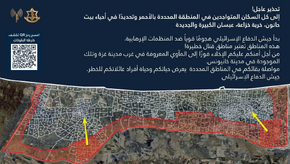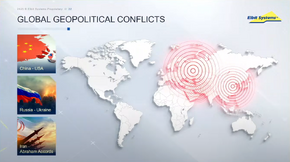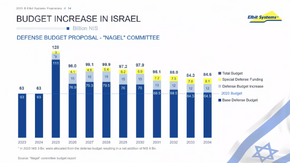I strongly disagree. The idea that because nobody complains you're allowed to break the law is absurd.
You conflate formalities with practicality. The actual capacity to complain to a higher authority and its capacity to pass judgment are very limited, such authority was only relatively recently established, and it's not even considered legitimate by the majority of the world.
What de facto serves as a control loop mechanism is how allies and enemies react.
Allies could range from full material and diplomatic support, to sanctions and military action (essentially turn from allies to enemies). Enemies could go nuts and they could also be neutral.
The topic of Israel has been manufactured into an inherently controversial one, and it becomes further reinforced with increasing muslim populations in the west and amplified typically by modern left wing parties. So the starting point is already shifted.
These things aren't only seen behind closed doors. Most of it is very public.
If we look at 2023-2025, Israel stood trial at the ICJ and was found not guilty. The ICJ's authority was subsequently severely reduced with some western nations rejecting orders, under the correct argument of ICJ overstepping their jurisdiction and making a mockery of justice.
Israel's allies took mostly symbolic actions to appease local anti-Israel voters, though at their own detriment ultimately. No real actions were made even by the most hostile western nations. And every arms supplier to Israel supported Israel to a large extent. No meaningful negative actions were made.
The reaction of other nations is currently the most effective way to gauge their approval or disapproval of a nation's actions.
It's the fact that it was a violation of US-led sanctions and iirc involved US technology that makes it particularly brazen. Also the fact that it went well beyond just a sale, but to joint cooperation and development. And let's not forget, this is what we see publicly. Consider that Israel is also still not willing to provide military aid to Ukraine. More Romanians weapons went to Ukraine then Israeli ones. There are many small indicators.
1. There is very little known about the Israeli involvement in Forpost. It violating sanctions is a bold and unfounded claim, as first an Israeli defense company wouldn't risk that. If it was somehow in violation, the US certainly didn't consider any involved Israeli company worthy of sanctions.
2. Israel does provide military aid to Ukraine. Your maximalist claim is unfounded. There are de facto Israeli weapons in Ukraine, including those sold to Ukraine as a first user.
In the Ukraine war thread I recently posted about Israeli company RADA's MHR radars being deployed.
3. Quantity is of little substance. Though I'd say in relative terms Israel did provide quite a lot. Israel's own expenditure of 4%-5% in peacetime is something no European country except Poland can match even when accounting for aid to Ukraine. All that money goes to fighting the axis, particularly Iran which is a party to the war in Ukraine.
Also being a country at war means Israel's capacity to aid Ukraine is much reduced.
First, because its own defense expenditure reached 10% last time I checked.
Second, because war materiel earmarked for export is sometimes pulled to assist the IDF directly. A high profile example is the cancellation of a deal to sell hundreds of Merkava 2 and 3 models.
Third, at the same time, Israeli defense industries prioritized Europe and delayed some deliveries to global customers while Europe's items were expedited. While at war, Israel's MIC supported European rearmament in overdrive, enabling countries to donate stuff they'd otherwise delay because replacements are overbooked.
Fourth, Israel through American help, accelerated withdrawal of equipment that was highly relevant to Ukraine, including its red squadrons entire stock of F-16s, and 8 Patriot batteries. The former likely used for parts, and the latter are being refurbished and upgraded as they were not upgraded in Israel for a while.
Ok, let's rewind. I wrote that Israel, among a list of others, shares some of the blame for the current situation in Syria. I then suggested that something ought to be done to protect Alawite civilians, pointing out that a logical way to do this would be for Russia to get agreement from Turkey and Israel, and step in, were it not for the war in Ukraine. You then promptly went off on a tangent about the trustworthiness of Alawites because of Assad, and how that means a military alliance with Israel would be impractical. What?
My comment about trustworthiness is unrelated to anything you said, but a continuation of my posts on the theme of Alawite options and potential Israeli opportunities.
Even if the Alawites begged Israel for help, the mentioned factors would certainly be taken into account when deciding if and how much to help.
After all, it's not trivial for Israel to start doing ISR sorties over north-west Syria. That requires diverting assets currently overflowing with tasks.
Who is the "they" here? We have an ethnic cleansing being conducted by a jihadi semi-state level actor against a population with only a weak set of local rebels to oppose it. Who are you trying to negotiate, or not negotiate, with?
Then they can form a coherent political group with single leadership to handle diplomacy.
My issue is that you place the prevention of ethnic cleansing contingent on a political arrangement between Israel and the local population, where the existence of a prior authoritarian regime makes such agreement (to you) inherently problematic. In other words, because you find it politically unsuitable, your implied position is "let them die". Did I "tell" well enough here?
I don't believe Israel should spend even more resources when its current commitments are crushing its economy.
Unless there is strategic gain to be made, or someone else is willing to fund it.
Let's not pretend that it was so one sided. While Alawite civilians are victims, it was Alawite gangs that initiated the current round of violence and themselves are responsible for some atrocities.
Such is the culture in the region. If a tribe gets the upper hand and kills all the other tribes, it will find divisions within its own and start killing again.
So Israel should not help those who do not seek friendly ties with it that transcend mere fear for their lives. Like shared values.
And it also shouldn't be educating people with dominantly barbaric culture that need to learn to stand on their own.
But if they choose to accept certain changes and to pledge to benefit Israel in exchange, then Israel should definitely be helping them.
However, there are 2 more important factors:
1. Israel is not the only candidate for sponsorship. Actually the least likely one.
2. As long as HTS butcher their own civilians (Any Syrians), Israel cannot trust them and will remain hostile to it.
3. As the Druze benefited from Israel's intervention, so do Alawites. The destruction of SAA's arsenal early on vastly reduced HTS's capacity for violence, and continued strikes this week further reinforce this.
As of yet, there is no sign of Israel targeting any major faction other than HTS, Palestinian groups (PIJ, Hamas), and various terror orgs close to Israel's border.
Again, not sure why your default position is the exploration of some sort of Israeli military alliance with them. I don't know where you are getting this or why it matters.
You directed this toward Israel. I mentioned higher likelihood of sponsorship from Russia, Iran, or Turkey.
I'm criticizing anyone and everyone who has been involved in Syria over the past ~15 years that isn't actively working to address this situation and prevent the murders. That includes Israel.
HTS has no access to Assad's arsenal. The playing field is more or less even now. Good luck, and you're welcome.
Yes. All while under the rule of HTS with active murders ongoing. My criticism in this case would go to the idea that it's on the Alawites to form alliances to prevent this. I believe all the countries that had a hand in Syria have an obligation to at least make an effort to stop the killings.
Those who do not wish to defend themselves, deserve none's protection.
If they wish to defend themselves, it becomes their responsibility to arrange that.
When people in my country were massacred, we didn't abandon everything and hoped the world would save us. None came. And everyone around us cheered, Sunnis and Alawites and Shi'ites and all. We started working. None owes us anything. None owes anyone anything.










